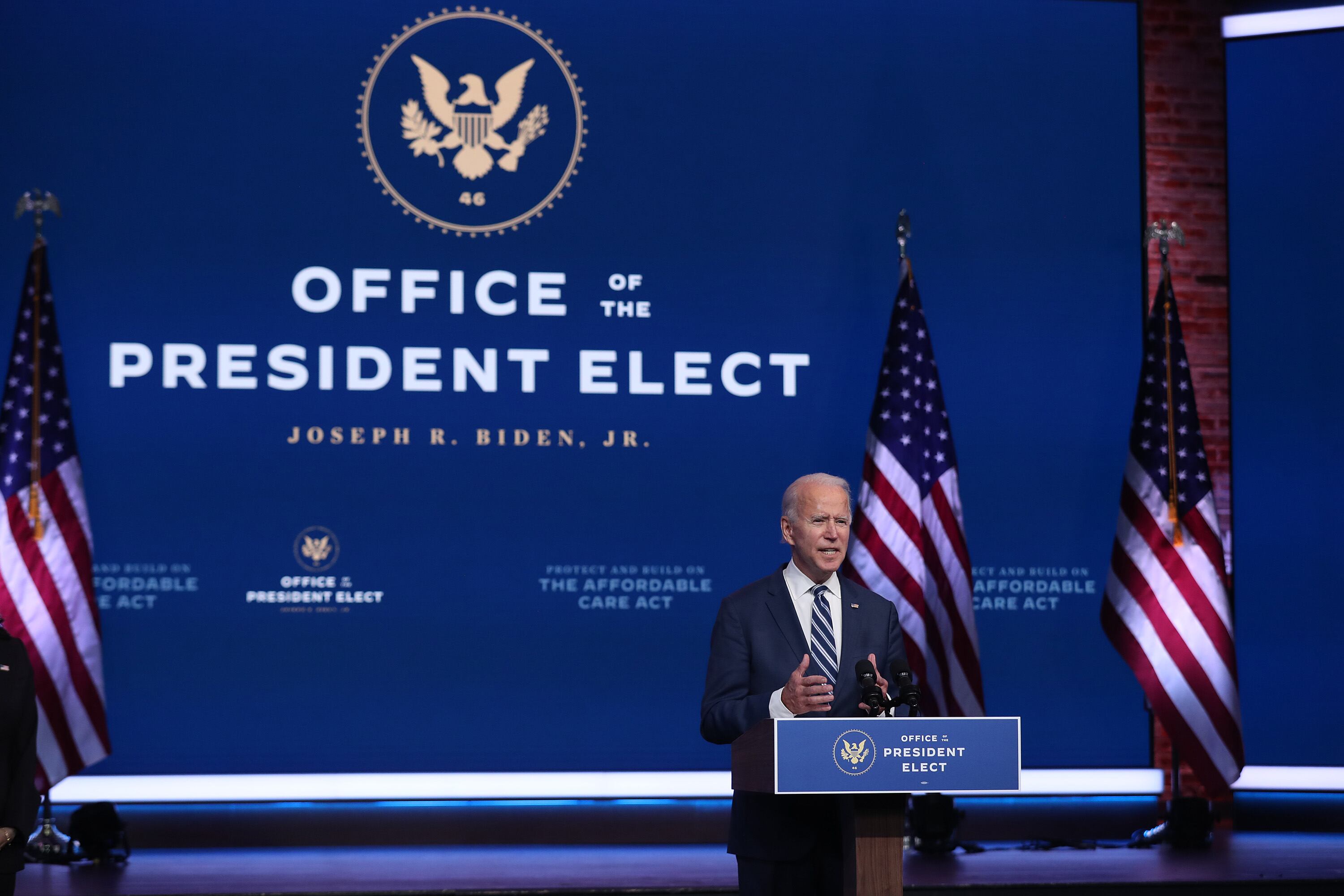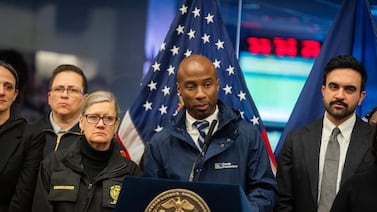President-elect Joe Biden’s education secretary will face an immediate high-stakes test: whether to allow states to forgo their usual standardized testing again.
State testing would bring a host of practical challenges at a time when many students are still learning exclusively from home. Critics, including many educators and their unions, also worry that it would sap resources and morale from an already battered school system.
But if states don’t test, it would mean going two straight years without one solid source of data on students’ English and math performance, making it more difficult to measure the gaps in learning many expect to result from months of disrupted schooling. Civil rights groups fear those gaps could then be ignored, particularly for low-income students and students of color.
The decision will have immediate effects for America’s schools and students and could have ripple effects for years to come. And the politics are fraught, potentially creating an intramural dispute among progressives, with teachers unions on one side and top Congressional Democrats plus some leading civil rights groups on the other.
“Sometimes you have to be willing to get your friends mad at you,” said Pedro Noguera, dean of the University of Southern California school of education, who backs giving tests but eliminating the stakes this year.
So far, Biden and his team have not tipped their hand. The campaign’s policy director said last month it was too soon to say whether testing should be canceled. “In some ways, the answer to this question depends on how much progress we can make in supporting our schools,” said Stef Feldman.
This week, a Biden transition team spokesperson would only point to the campaign’s education plans, which don’t address the issue.
Where most agree: Testing this year is going to be hard to pull off
The decision was less complicated last school year. As COVID-19 spread, schools across the country closed their buildings just before they were set to administer the tests, which are required by federal law in grades three through eight and once in high school.
Education Secretary Betsy DeVos quickly called off testing, saying the federal education department would grant waivers to any state that sought one. All 50 eventually did.
This year, with many students back in school buildings, testing at least seems plausible. But some school districts remain fully virtual, and even in those that have opened their buildings, many students have opted for fully remote instruction.
One possibility would be to allow students to take a digital exam at home while proctors use video to monitor students. That would raise privacy and exam security concerns, though, and it’s not clear whether that setup could gain any traction.
“We’ve had conversations regarding remote testing and what states feel needs to be in place for that to go well,” said Magda Chia of the Smarter Balanced Assessment Consortium, the developer of a test, used in 13 states, which is already administered on a computer in schools. No decisions have been finalized, she said.
Many states give paper-and-pencil tests, though, and shifting to a digital version quickly would be a challenge.
“I’m not aware of any state right now that says we’re definitely going with remote testing,” said Marianne Perie, a testing expert who consults with many states on their testing programs. “That brings us to the problem of — if we’re going to do in-person testing and the schools are operating remotely, will kids come in?”
If the tests are only given in person, and many students and families decline to come into buildings, it could be hard to get valid results. It could also mean that students who might have lost the most learning — because they stayed home — will be the least likely to be tested.
Some states are making modest changes to make exams more palatable, like shortening the test or dropping an essay section. But it’s not clear that will be enough to win over parents skeptical about sending their children into school buildings.
“My response was, ‘Make me,’” said a Charlotte, North Carolina parent upon learning her son was expected to return for in-person testing this spring, according to a local news report.
At the moment, it’s not clear whether states are preparing for those challenges if testing proceeds.
“In the conversations I’ve had with states, I’ve found remarkable the extent to which I’m not hearing them talk about plan B and C,” said Derek Briggs, a professor at the University of Colorado who sits on several state testing committees.
The new administration could make a decision with an ear to teachers unions
DeVos said in September that she was unlikely to waive testing again. But the decision will ultimately be up to her replacement, appointed by President-elect Biden.
The new education secretary will have to grapple with both the practical challenges of testing and the political pressure from both directions.
“There could be a change in administration and the framework around spring testing will all become clearer in the next few days and weeks than it is now,” California state board President Linda Darling-Hammond said last week. Darling-Hammond chairs Biden’s education transition team.
That team includes four members of the country’s two largest teachers unions, the National Education Association and the American Federation of Teachers, both long critical of standardized testing.
“With COVID continuing to spike, states need the option of waivers this school year,” AFT president Randi Weingarten said in a statement. She also called for “a more creative and flexible approach to federal testing in the future.”
“All of that energy spent on that versus how you’re going to address students returning to school safely and equitably — it diverts attention away from the real issues that our students are facing,” said Becky Pringle, president of the NEA. She noted, though, “We absolutely need to assess what the learning has been and what we yet need to do.”
Neither Pringle nor Weingarten offered specifics about how they would prefer to assess students if regular state testing is canceled.
Weingarten herself is reportedly being considered for education secretary, as is Pringle’s predecessor Lily Eskelsen García. The unions’ sway in a Biden administration could present an opening for them to shape policy around testing for years to come.
Pringle said the NEA has made clear to the Biden team where it stands.
“Of course you’re not going to impose the testing program that has existed over the last several years, because that’s unfair,” she said. “Do we explicitly articulate that in our priorities? Yes.”
Civil rights groups and top Congressional Democrats have indicated support for continued testing
It’s not just teachers unions making the case to waive testing this year: a number of state and local education officials from across the country have said the tests should be canceled and sought a waiver from the U.S. Department of Education.
“Our overwhelming and energetic consensus is that state-administered and state-required assessments are counterproductive during the current health crisis,” a coalition of Colorado school superintendents wrote in a recent letter to state officials.
Other officials, including the organization representing state school leaders, say testing is still necessary.
Parents, meanwhile, are divided on whether testing should happen this year, polls show.
Most notably, top Congressional Democrats, Sen. Patty Murray and Rep. Bobby Scott, have already weighed in to say testing is necessary to document widely expected learning loss.
“Especially when it comes to the disparities that harm so many students of color, students with disabilities and students whose families have low incomes, we’ve got to have data that shows us where we’re falling short so we can better support those students,” Murray said in a statement after DeVos said she didn’t plan to issue waivers.
Some national civil rights groups, which have fought for the federal education law to keep requiring annual testing, are also likely to be wary of waivers for the same reason.
“This is the wrong time to be considering changes to the assessment and accountability activities of Spring 2021,” Liz King, director of education policy for The Leadership Conference on Civil and Human Rights, a coalition of civil rights groups, said in a statement.
Representatives from a handful of civil rights groups are on Biden’s education transition team.
The next education secretary will also have to decide whether to waive federal rules that require identifying low performing schools based in large part on test scores. States and local districts, too, will have to decide whether to use tests for things like teacher evaluation and student grade promotion or high school graduation.
What’s not clear is how vigorously civil rights groups and Congressional Democrats will oppose waivers, and how well the virus will be contained in coming months.
Experts say if testing happens, it shouldn’t come with high stakes for schools, students, or teachers.
“We don’t want to penalize anybody this year based on assessment data because we don’t have the kind of confidence,” said Perie, the testing consultant. “But if it’s used to figure out, where do we seem to have some shining stars that we can learn from, and where does it look like there are some gaps in knowledge that we want to get some additional resources in there — that’s a different story.”
Noguera says the key is to drop the stakes and figure out how to help kids who are behind. “If they’re using it to document learning loss and then to devise a strategy about what to do, that makes a lot of sense,” he said.
“The counterargument to that is, can’t we just operate under the assumption it’s bad?” said Briggs, referring to learning loss. “I don’t need to test kids to tell me that.”
Erica Meltzer contributed reporting.






